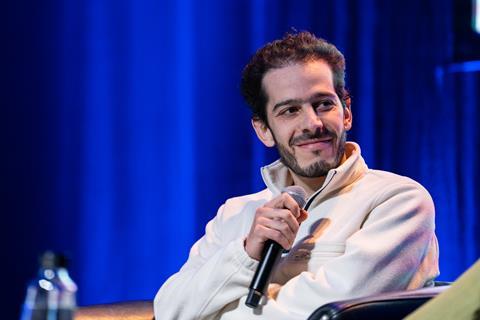
The importance of immersive content to the future of the film industry was the focus of conversation on the opening day of the Geneva Digital Market (GDM), the Swiss event focused on audiovisual innovation.
“The generations that were raised during Covid and had to stay at home for a few years are eager to have out of home experiences,” said Elisha Karmitz, managing director of Mk2, France’s arthouse cinema powerhouse. “It is a part of life this desire. It’s in the DNA of people to go out and have collective experiences.”
With 26 sites in Paris and Spain, Mk2 also operates the first site entirely dedicated to virtual reality at the mk2 Bibliothèque in Paris.
Karmitz contributed to a panel discussion bannered ‘Will the Revolution be Immersive For Cinemas?’ alongside Babette Wijntjes, the founder of Cassette, an independent film company and virtual reality publisher in the Benelux and Caecilia Charbonnier, co-founder of Swiss banner Dreamscape Immersive.
Wijntjes, whose previous hats have included roles as CEO of independent distributor Cinemien, and founder of arthouse outfit Vedette, has form:
She is also the brain behind the VR platform Nu:Reality from her other company Cassette which showcases artistic VR pieces in the daily programming of seven cinemas in the Netherlands.
She pointed to an in-house survey that indicated 70% of the visitors to VR are women and 30% are men, aged between 35 to 55 and up. “Young people are less, but they’re coming in small numbers,” she noted. “But the young people come as extra audiences, so it is good news.”
The willingness to recommend immersive VR showcases among family and friends or to bring children leads to return visits to the cinema.
Charbonnier is a co-founder of Dreamscape Immersive, and president of the Virtual Switzerland network and helped create VR technology used by Dreamscape and Hollywood.
For her part, there is a lower age limit of eight-years-old for her immersive work with the DreamWorks How to Train Your Dragon experience. She pointed to bringing in a 99-year-old gentleman to the Dragon experience in the heart of Geneva. “From eight to 90, there’s a mix of women and men and in terms of average age, it’s more 30-32 for immersive,” Charbonnier.
Mk2’s Karmitz said his aim is to secure them young and keep them in cinemas for immersive experiences and films alike. He wants to build a dedicated immersive screening space in France’s national library in Paris.
“What we’re expecting from turning cinema rooms into immersive exhibition spaces is to attract tourists in Paris and new audiences driven by tourism,” Karmitz said. “Target 15 to 25 year olds and then encourage fidelity to the cinema so they keep coming back as they get older.”
Jean-Pierre Greff, president of the Plaza Foundation, an organisation leading the renovation of the building housing Le Plaza, a historic cinema in Geneva,, with the aim of creating a large cultural complex set to open in 2026, delivered an update on plans ahead of the panel. He said the Plaza Centre Cinema will feature several facilities, including the restored cinema, an immersive room, exhibition spaces and a cinema-hotel with large scale screens in every one of them, a la Hotel Paradiso.
To secure the future of immersive entertainment, whether in spaces alongside cinema screens, dedicated venues or even theatre lobbies, immersive content will have to be staged and made with audiences in mind, the speakers agreed.
Later in the day, Ana Brzezińska, immersive curator and producer specialising in AR/MR/VR technologies, delivered a talk on her work with Tribeca Film Festival to reimagine its immersive lineup, this year in collaboration with the Museum of Art and Technology, Mercer Labs in New York.
Brzezińska emphasised the importance of understanding audience needs, developing new business models, and documenting the immersive industry’s history to ensure its growth and sustainability.
“We really need to start thinking deeply about our identity as an industry, and start thinking about ourselves as an independent creative discipline, rather than something that is adjacent to museums or film festivals,” Brzezińska said. “There’s never been a better moment to build these bridges with existing organisations, with museums, with cinemas, because this is probably the first time I can think of when they really need us same way as we need them.
“We need to understand the people we’re creating for and their profound needs.”

























No comments yet